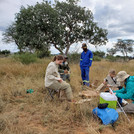NamTip: A Namibian Perspective on Desertification Tipping Points in the Face of Climate Change
Official website
NamTip is one of seven projects in the "BioTip" (now “GlobalTip”) funding line. Within the framework of this programme, worldwide research is being conducted into how critical thresholds can be recognised at an early stage and thus how countermeasures can be initiated in good time. The initiative is funded by the Federal Ministry of Education and Research (BMBF, duration of first phase 02/2019 - 07/2023, and of second phase 09/2023 – 08/2025).
Tipping points play an important role in dryland ecosystems. When pastures are heavily overgrazed and droughts occur in addition, they can "tip" into a desert-like state. Perennial forage grasses are then often permanently lost, leaving behind barren soils. Desertification is a pressing problem in Namibia.
Mission
In the NamTip project, scientists and stakeholders are working closely together to gain a better understanding of "desertification tipping points" and their impact on the livelihoods of Namibian farmers. At the same time, they are exploring ways to avoid such undesirable impacts - for example, through appropriate early warning systems. To this end, a wide variety of interdisciplinary studies are being conducted on the semi-arid pastureland of farms in the Greater Waterberg Landscape. At the same time, a transdisciplinary approach is pursued in order to ensure early integration of the stakeholders and to ensure that the project is geared to the problems and needs on site.
The aims of NamTip are:
- Developing an interdisciplinary perspective for a better conceptual understanding of socio-ecological tipping points
- Improving the empirical knowledge about the formation of cascading tipping points
- Generating action knowledge such as management options enabling stakeholders to restore ‘tipped’ areas
- Creation of actionable and transferable knowledge for stakeholders and practitioners.
In the NamTip project we are entrusted with the scientific-technical coordination work and the vegetation related ecological studies. We study plant populations and communities as well as forage quantity and quality using a comparative as well as an experimental research approach.
In the comparative approach, we investigate ecosystem structure and function along grazing gradients using a space-time substitution where we assume that gradients stretch from tipped to non-tipped conditions.
In terms of experimental studies, we are setting up the central research platform "TipEx", which experimentally pushes a savanna area in Namibia beyond a Desertification Tipping Point by combining two triggers for catastrophic change - heavy grazing and severe drought.
Please have a look on the official website for more details .
Aims | NamTip: A Namibian Perspective on Desertification Tipping Points in the Face of Climate Change Within the comparative approach we aim to identify patterns in plant populations, plant communities and forage quality that enhances our understanding of tipping points or can even serve as early-warning indicators. The experimental approach shall complement the comparative approach with mechanistic information. |
Approach | Comparative approach: We installed observational plots along grazing gradients located at different communal and commercial farms. There we conduct plant inventories, perennial grass species counts, collect plant and biomass samples. Experimental approach: We established an experiment with a full-factorial design combining 3 clipping treatments with ambient and reduced rainfall. We examine the effects on permanent observation quadrats via plant inventories, perennial grass species counts and biomass collections. |
Expected Outcome | We hypothesise that a Desertification Tipping Point will cascade through ecosystem compartments and that this will have negative impacts on biodiversity and the ecosystem service of forage provision. |
Persons involved
| Project head
PostDoc
PhDs
Coordinator (contact person) Contact: thomas.bringhenti@uni-potsdam.de |
Cooperation partners | EduVentures Trust, Namibia Helmholtz Centre for Environmental Research (UFZ), Germany Institute for Social-Ecological Research (ISOE), Germany Namibia National Farmers Union, Namibia Namibia University of Science and Technology, Namibia University of Bonn, Germany University of Cologne, Germany University of Namibia, Namibia University of Tübingen, Germany |
Outreach | Zimmer, K., Amputu, V., Schwarz, L.-M., Linstädter, A., Sandhage-Hofmann, A. (2024). Soil characteristics within vegetation patches are sensitive indicators of savanna rangeland degradation in central Namibia. Geoderma Regional, e00771. https://doi.org/10.1016/j.geodrs.2024.e00771 Männer, F.A., Muro, J.M., Ferner, J. Schmidtlein, S., Linstädter, A. (in print). Predicting forage provision of grasslands across climate zones by hyperspectral measurements. In: National Organizing Committee of 2023 IGC (Ed.), International Grassland Congress Proceedings. Conference May 2023. https://doi.org/10.52202/071171-0399 Schwarz, L.-M., Carmona, C.P., Bilton, M.C., Munyebvu-Chambara, F., Behn, K., Linstädter, A. (in print). Evaluating functional diversity as potential early-warning indicator of rangeland degradation. In: National Organizing Committee of 2023 IGC (Ed.), International Grassland Congress Proceedings. Conference May 2023. https://doi.org/10.52202/071171-0063 Männer, F.A., Dubovyk, O., Ferner, J., Freyaldenhoven, A., Muro, J., Schmidtlein, S., Linstädter, A. (2022). Forage quality predicted by hyperspectral reflection readings across climate zones. In: Grassland Science in Europe, Vol. 27 – Grassland at the heart of circular and sustainable food systems. Proceedings of the 28th European Grassland Federation General Meeting, France, ISBN: 978-2-7380-1445-0, p. 656 – 658 Männer, F.A., Schwarz, L.-M., Menestrey Schwieger, D., Amputu, V., Bilton, M.C., Brinkmann, K., Dressler, G., Hamunyela, N., Heita, H., Heshmati, S., Liehr, S., Mbidzo, M., Munyebvu-Chambara, F., Nesongano, W.C., Rauchecker, M., Sandhage-Hofmann, A., Tielbörger, K., Zimmer, K., Linstädter, A. (2021). An integrated framework to study ecological tipping points in social-ecological systems. In: National Organizing Committee of 2021 IGC/IRC Congress (Ed.), International Grassland Congress Proceedings. Kenya Agricultural and Livestock Research Organization, Online Conference Oct 2021. https://uknowledge.uky.edu/igc/24/1-2/2/ Munyebvu-Chambara, F., Nesongano, W.C., Bilton, M.C., Linstädter, A. (2021). Utilizing perennial grass species’ population patterns to detect looming desertification tipping points in semi-arid regions. In: National Organizing Committee of 2021 IGC/IRC Congress (Ed.), International Grassland Congress Proceedings. Kenya Agricultural and Livestock Research Organization, Online Conference Oct 2021. https://uknowledge.uky.edu/igc/24/5-2/21/
|








